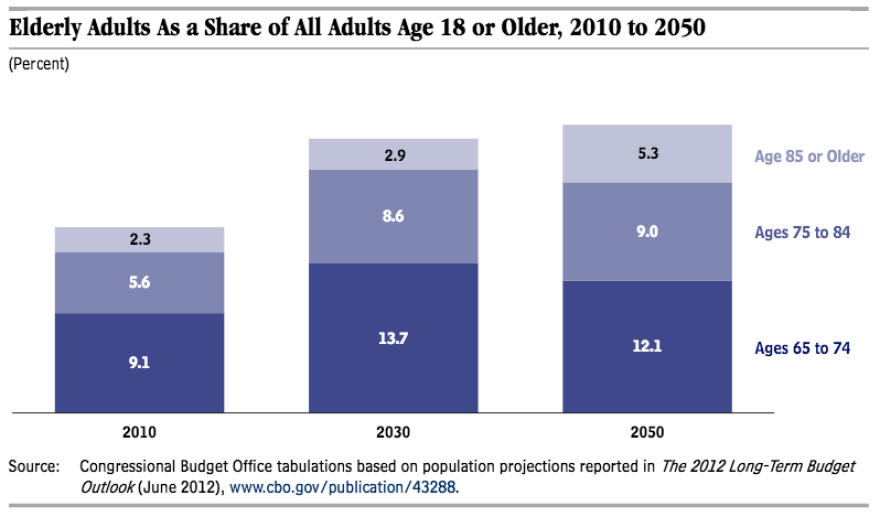One of the fastest growing industries in the U.S. is the business of senior care. As baby boomers move into their 60s and 70s, demand and competition for quality care is growing fast. There are many companies that provide medical needs to seniors. One in Wichita offers a comprehensive list of services and 95 percent of their clients are Medicare or Medicaid beneficiaries. KMUW’s Sean Sandefur reports…
It’s cold. There’s snow, ice and salt cracking underfoot. Tony Dezenzio wheels his wife, Diane, from their government-subsidized independent living center at 13th and Spruce to a van destined for the eye doctor. Both live on Social Security and both are enrolled in a program called Via Christi HOPE, which is aimed at those 55 and up who have numerous medical conditions, but are still able to live at home. The program also provides rides to and from doctor’s appointments.
Tony Dezenzio helps his wife into the van, waves goodbye and waits for his own transport, which is headed for Via Christi HOPE’s facilities.
“We were satisfied with Medicaid," Dezenzio says.
That is, until they discovered that receiving Medicaid through KanCare led to spend down payments, which he says became too costly. So, when a representative for Via Christi HOPE visited their independent living center, they decided to go for it.
“We signed up, and we really like it now that I understand the whole program,” he says.
Via Christi HOPE is a local chapter of PACE, which stands for Program of All-Inclusive Care for the Elderly. It’s a nationwide initiative which takes a person’s Medicare or Medicaid payments and uses them as a membership fee. Depending on a person’s income, clients might also have to kick-in additional money. But it’s affordable and includes prescriptions and funding for any medical services that are needed.
“Since I’ve been in HOPE, I’ve gotten my rotator cuff surgery done, teeth work done, eye work and diabetic shoes," Dezenzio says. "Everything’s just really clicking now.”
Dezenzio received extensive physical therapy for his rotator cuff and says without it, he'd still be in a lot of pain.
As Dezenzio checks into the Via Christi HOPE at Central and McLean, he’s greeted by staff. He still comes twice a week even though he’s completed his physical therapy. He socializes and attends counseling. He says he suffers from mild depression, which according to Brad Raymond, director of Marketing and Intake here, is somewhat common.
“The isolation often times goes alongside depression," Raymond says. "Giving people the chance to get out of the house, to be around people, to take a bus ride and go around town, can make a huge impact on their overall health."

Raymond is standing in a large room full of clients. They play cards, listen to music, or work on their crochet.
There are 207 people enrolled here. The Medicare and Medicaid funding, as well as private pay money, all go into one pool. That pool is then used for everything from transportation, to food, to nurse salaries.
Profitability depends on how much care is needed.
“Month to month, it probably varies on how we do in that regard," Raymond says. "Basically, we're like an insurance company. We're dealing with a high risk, high level of care population.
If we can keep people healthy, avoid hospitalizations and long term care placement, if we can keep them in their own home, then that funding goes a lot further, just like any insurance company would.”
Senior care is becoming more and more competitive—especially those for the companies helping seniors remain independent. In-home health care businesses are climbing Forbes’ annual list of Best Franchise Opportunities. It’s a burgeoning industry. But many people can't afford these in-home care services, which is where Via Christi Hope steps in.

“Basically we work primarily with the lower income, often times underserved population," Raymond explains. "What we try to do is keep that population at home and provide care for them at a cost that saves money to the state, saves money to the federal government, and has better outcomes for the people in our programs.”
One of the ways this program helps people to live independently is through physical therapy.
Mary Bird just got done with a workout. She’s been with the program since 2011.
“I had had surgery on my back and when I got here, I could barely walk," Bird says.
She comes to therapy five days a week to keep up her strength. It consists of a lot of stretching, but she also works hard on the stationary bike.
“I wanted to get on the stationary (bike) because I went out and bought me a bicycle, which everyone told me told me, ‘don’t do that!'" Bird says.
"The first day that I got on my bike, I went half of a block, which was a milestone for me.”
PACE programs like Via Christi HOPE are currently available in Wichita and Topeka. Efforts are underway to make them available statewide.

